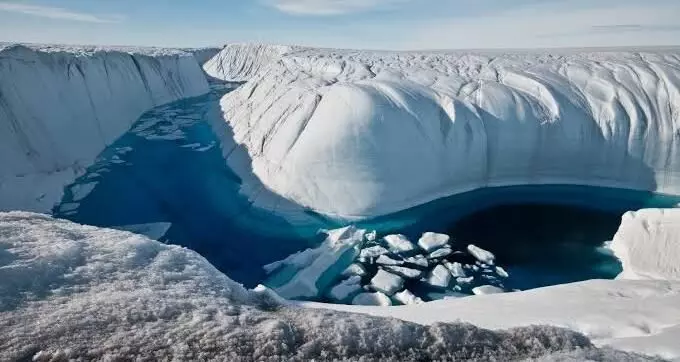
Greenland's ice sheet has lost enough water in 20 years to submerge entire US: Study
text_fieldsCopenhagen: Several studies over the years have found that Greenland's massive, melting ice sheet is proof of evidence of how climate change will continue to alter human lives for centuries to come.
According to a data released this week by Danish researchers, Greenland's immense ice sheet has lost enough ice in the past 20 years to submerge the entire United States in half a metre of water.
As per reports from NASA, the climate is warming faster in the Arctic than anywhere else on the planet and melting ice from Greenland is now the main factor in the rise in the Earth's oceans.
Polar Portal, a joint project involving several Danish Arctic research institutes has said that the Greenland ice sheet has lost about 4,700 billion tonnes of ice since measurements began in 2002.
This represents 4,700 cubic kilometres of melted water -- "enough to cover the entire US by half a meter" -- and has contributed 1.2 centimetres to sea-level rise, the Arctic monitoring website added.
Polar Portal's findings are based on satellite imagery from the US-German GRACE programme (Gravity Recovery and Climate Experiment), which showed the ice melt to be most severe near the coasts of the Arctic territory, at the edge of the ice sheet.
In these peripheral zones, "independent observations also indicate that the ice is thinning, that the glacier fronts are retreating in fjords and on land, and that there is a greater degree of melting from the surface of the ice", the website said.
The west coast of Greenland is particularly affected, according to the data.
Climate change is particularly alarming in the Arctic, which scientists say is warming at a rate three to four times the global average.
According to a study published by NASA in late January, the accelerated melting near Greenland's coasts can be explained by the warming of the Arctic Ocean.
The phenomenon "is melting Greenland's glaciers at least as much as warm air is melting them from above".
Melting ice from Greenland is currently the main factor in the rise in the Earth's oceans and the territory's glaciers are now retreating six to seven times faster than they were 25 years ago, the US agency added.
According to climate scientists, the Greenland ice sheet contains enough water to raise the oceans by more than seven metres, and the ice sheet in Antarctica contains enough for a rise of almost 50 metres.
Arctic sea ice cover, although its melting does not affect sea levels, has also shrunk considerably, losing almost 13 per cent of its average surface area every 10 years.
























